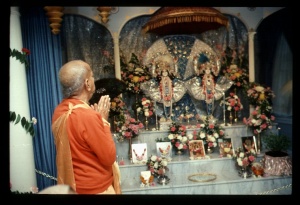CC Antya 11.105 (1975): Difference between revisions
(Vanibot #0027: CCMirror - Mirror CC's 1996 edition to form a basis for 1975) |
(Vanibot #0019: LinkReviser - Revise links, localize and redirect them to the de facto address) |
||
| Line 2: | Line 2: | ||
<div style="float:left">'''[[Sri Caitanya-caritamrta (1975)|Śrī Caitanya-caritāmṛta (1975)]] - [[CC Antya (1975)|Antya-līlā]] - [[CC Antya 11 (1975)|Chapter 11: The Passing of Haridāsa Ṭhākura]]'''</div> | <div style="float:left">'''[[Sri Caitanya-caritamrta (1975)|Śrī Caitanya-caritāmṛta (1975)]] - [[CC Antya (1975)|Antya-līlā]] - [[CC Antya 11 (1975)|Chapter 11: The Passing of Haridāsa Ṭhākura]]'''</div> | ||
<div style="float:right">[[File:Go-previous.png|link=CC Antya 11.104 (1975)|Antya-līlā 11.104]] '''[[CC Antya 11.104 (1975)|Antya-līlā 11.104]] - [[CC Antya 11.106 (1975)|Antya-līlā 11.106]]''' [[File:Go-next.png|link=CC Antya 11.106 (1975)|Antya-līlā 11.106]]</div> | <div style="float:right">[[File:Go-previous.png|link=CC Antya 11.104 (1975)|Antya-līlā 11.104]] '''[[CC Antya 11.104 (1975)|Antya-līlā 11.104]] - [[CC Antya 11.106 (1975)|Antya-līlā 11.106]]''' [[File:Go-next.png|link=CC Antya 11.106 (1975)|Antya-līlā 11.106]]</div> | ||
{{CompareVersions|CC|Antya 11.105|CC 1975|CC 1996}} | |||
{{RandomImage}} | {{RandomImage}} | ||
==== TEXT 105 ==== | ==== TEXT 105 ==== | ||
<div class="verse"> | <div class="verse"> | ||
:mahā-bhāgavata | :mahā-bhāgavata haridāsa--parama-vidvān | ||
:e saubhāgya | :e saubhāgya lāgi' āge karilā prayāṇa | ||
</div> | </div> | ||
| Line 18: | Line 17: | ||
<div class="synonyms"> | <div class="synonyms"> | ||
mahā-bhāgavata—great devotee; haridāsa—Haridāsa Ṭhākura; parama-vidvān—the most learned; e saubhāgya | mahā-bhāgavata—great devotee; haridāsa—Haridāsa Ṭhākura; parama-vidvān—the most learned; e saubhāgya lāgi'-because of his great fortune; āge—first; karilā prayāṇa—he passed away. | ||
</div> | </div> | ||
| Line 25: | Line 24: | ||
<div class="translation"> | <div class="translation"> | ||
Haridāsa Ṭhākura was not only the topmost devotee of the Lord but also a great and learned scholar. It was his great fortune that he passed away before Śrī Caitanya Mahāprabhu. | Haridāsa Ṭhākura was not only the topmost devotee of the Lord, but also a great and learned scholar. It was his great fortune that he passed away before Śrī Caitanya Mahāprabhu. | ||
</div> | </div> | ||
| Line 32: | Line 31: | ||
<div class="purport"> | <div class="purport"> | ||
Haridāsa Ṭhākura is mentioned here as the most learned scholar, parama-vidvān. Actually, the most important science to know is the science of getting out of the clutches of material existence. Anyone who knows this science must be considered the greatest learned person. Anyone who knows the temporary situation of this material world and is expert in achieving a permanent situation in the spiritual world, who knows that the Supreme Personality of Godhead is beyond the jurisdiction of our experimental knowledge, is understood to be the most learned scholar. Haridāsa Ṭhākura knew this science perfectly. Therefore, he is described in this connection as parama-vidvān. He personally preached the importance of chanting the Hare Kṛṣṇa mahā-mantra, which is approved by the revealed scriptures. As stated in the Śrīmad-Bhāgavatam ([[SB 7.5.23-24| | Haridāsa Ṭhākura is mentioned here as the most learned scholar, parama-vidvān. Actually, the most important science to know is the science of getting out of the clutches of material existence. Anyone who knows this science must be considered the greatest learned person. Anyone who knows the temporary situation of this material world and is expert in achieving a permanent situation in the spiritual world, who knows that the Supreme Personality of Godhead is beyond the jurisdiction of our experimental knowledge, is understood to be the most learned scholar. Haridāsa Ṭhākura knew this science perfectly. Therefore, he is described in this connection as parama-vidvān. He personally preached the importance of chanting the Hare Kṛṣṇa mahā-mantra, which is approved by the revealed scriptures. | ||
As stated in the Śrīmad-Bhāgavatam ([[SB 7.5.23-24|7.5.24]]): | |||
:iti puṁsārpitā viṣṇau bhaktiś cen nava-lakṣaṇā | :iti puṁsārpitā viṣṇau | ||
:kriyeta bhagavaty addhā tan manye | :bhaktiś cen nava-lakṣaṇā | ||
:kriyeta bhagavaty addhā | |||
:tan manye 'dhītam uttamam | |||
There are nine different processes of devotional service to Kṛṣṇa, the most important being śravaṇaṁ kīrtanam | There are nine different processes of devotional service to Kṛṣṇa, the most important being śravaṇaṁ kīrtanam-hearing and chanting. Haridāsa Ṭhākura knew this science very well, and he can therefore be called, technically, sarva-śāstrādhītī. Anyone who has learned the essence of all the Vedic scripture is to be known as a first-class educated person, with full knowledge of all śāstra. | ||
</div> | </div> | ||
Latest revision as of 14:40, 18 September 2020

A.C. Bhaktivedanta Swami Prabhupada
TEXT 105
- mahā-bhāgavata haridāsa--parama-vidvān
- e saubhāgya lāgi' āge karilā prayāṇa
SYNONYMS
mahā-bhāgavata—great devotee; haridāsa—Haridāsa Ṭhākura; parama-vidvān—the most learned; e saubhāgya lāgi'-because of his great fortune; āge—first; karilā prayāṇa—he passed away.
TRANSLATION
Haridāsa Ṭhākura was not only the topmost devotee of the Lord, but also a great and learned scholar. It was his great fortune that he passed away before Śrī Caitanya Mahāprabhu.
PURPORT
Haridāsa Ṭhākura is mentioned here as the most learned scholar, parama-vidvān. Actually, the most important science to know is the science of getting out of the clutches of material existence. Anyone who knows this science must be considered the greatest learned person. Anyone who knows the temporary situation of this material world and is expert in achieving a permanent situation in the spiritual world, who knows that the Supreme Personality of Godhead is beyond the jurisdiction of our experimental knowledge, is understood to be the most learned scholar. Haridāsa Ṭhākura knew this science perfectly. Therefore, he is described in this connection as parama-vidvān. He personally preached the importance of chanting the Hare Kṛṣṇa mahā-mantra, which is approved by the revealed scriptures.
As stated in the Śrīmad-Bhāgavatam (7.5.24):
- iti puṁsārpitā viṣṇau
- bhaktiś cen nava-lakṣaṇā
- kriyeta bhagavaty addhā
- tan manye 'dhītam uttamam
There are nine different processes of devotional service to Kṛṣṇa, the most important being śravaṇaṁ kīrtanam-hearing and chanting. Haridāsa Ṭhākura knew this science very well, and he can therefore be called, technically, sarva-śāstrādhītī. Anyone who has learned the essence of all the Vedic scripture is to be known as a first-class educated person, with full knowledge of all śāstra.